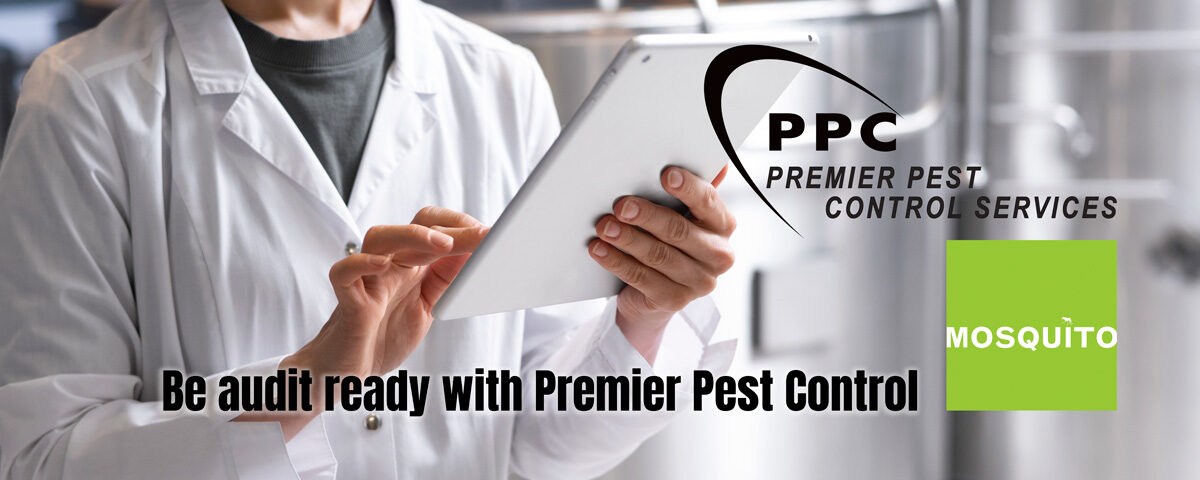
How to prevent pest issues in summer
May 10, 2024
Critical Pest Control Issues for Food Industry Managers
September 3, 2024Preparing for Your Pest Control Audit: A Guide for the Food Industry
As a professional in the food and associated industries, you know that pest control is non-negotiable when it comes to maintaining the integrity of your operations.
Preparing for an audit by bodies such as BRC, SALSA or one of the retailers can be daunting, but with the right approach, the pest control side of things can be straightforward and stress-free.
Here’s how to make sure you’re ready when the auditor comes knocking.
- Choose the Right Pest Controller
Selecting a pest control provider with a solid background in food safety and relevant specifications is crucial. Ensure they have experience with BRC, SALSA, and retailer-specific requirements. Don’t just take their word for it—ask for references that can vouch for their track record in your industry. - Communicate Before the Audit
Ahead of the audit, sit down with your pest control provider. Do you fully understand their documentation, processes, and the activities they carry out on your site? More importantly, can you explain these to an auditor? Clarity here is key—if you’re not familiar with the specifics, ensure your pest control contractor is ready and willing to join you during the audit. - Conduct Regular Site Walk-Throughs
Take the time to walk around your site with your pest control team, ideally during a service visit. This isn’t just a formality; it’s an opportunity to get a real grasp on the pest control measures in place and how they function. Understanding these activities can help you answer any questions that may arise during the audit. - Risk Assessment and Equipment Check
Ensure that a thorough risk assessment has been conducted, especially in high-risk areas. Check that all necessary equipment is in appropriate locations and functioning as it should. Are the fly control units properly positioned? Have they been serviced, and are the tubes changed according to manufacturer’s recommendations? - Keep Documentation Up to Date
Make sure all service visits are current and that every report is easily accessible. If your pest control provider offers an online portal, do you have access? More importantly, have you received training on how to use it effectively? This can be a huge asset during an audit, but only if you know how to navigate it. - Review and Document Actions
Review all pest control actions regularly. Discuss these with your team and your pest control contractor, and make sure any corrective actions are documented. Auditors will want to see that you’re proactive in managing pest risks, not just reactive. - Comprehensive Record-Keeping
Ensure that all relevant documents are up to date, including risk assessments for pests, equipment, and health and safety. This is often a sticking point during audits, so don’t leave it to the last minute. - Trend Analysis
Make sure that trend analysis has been carried out annually for all pests, including insects. This not only demonstrates compliance but also shows auditors that you are monitoring for future issues by scrutinising historical records. - Comprehensive Service Documentation
Every service visit, whether it’s a routine inspection, a technical review, or a fly control service, should be carried out on time and documented. This creates a clear trail of activity that can be easily reviewed during an audit. - Pest Activity Resolution
Any pest activity that has been identified should not only be resolved but also documented. This demonstrates your commitment to maintaining a pest-free environment and shows that you have a system in place to address issues swiftly and effectively. - Staff Training
Ensure that key staff members have received pest awareness training. This isn’t just about ticking a box—it’s about ensuring that everyone on your team knows the role they play in preventing pest issues. - Structural Integrity
Finally, inspect your premises for any structural issues that could pose a risk, particularly concerning birds. Even the smallest gaps can be an invitation for pests, so make sure your building is sound. It is recommended that you escort the technician or field biologist during the service visit.
By following these steps, you’ll not only be well-prepared for your audit but also demonstrate a proactive approach to pest control that will resonate with auditors. Remember, preparation is key, and with the right partner and a solid plan, you should pass your next pest control audit with flying colours.
If you’re not entirely satisfied with your current pest control contractors, or if you’re feeling uncertain about your upcoming audit then let us know. We’re here to ensure your site remains pest-free and audit-ready, every step of the way.




